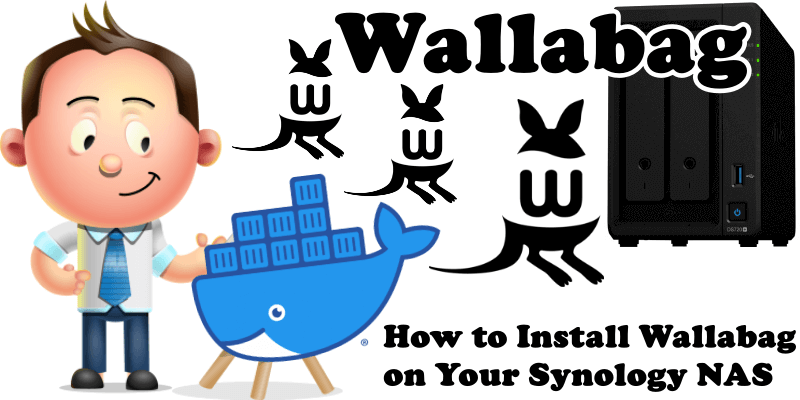
Wallabag is a web application allowing you to save web pages for later reading. Click, save and read it when you want. It extracts content so that you won’t be distracted by pop-ups and ads. The alternative to Wallabag is Shiori. In this step by step guide I will show you how to install Wallabag on your Synology NAS using Docker.
This guide works perfectly with the latest Wallabag 2.6.14 release.
STEP 1
Please Support My work by Making a Donation.
STEP 2
Install Container Manager via Synology “Package Center”. If you run an older DSM version (under 7.2), search for Docker instead of Container Manager.
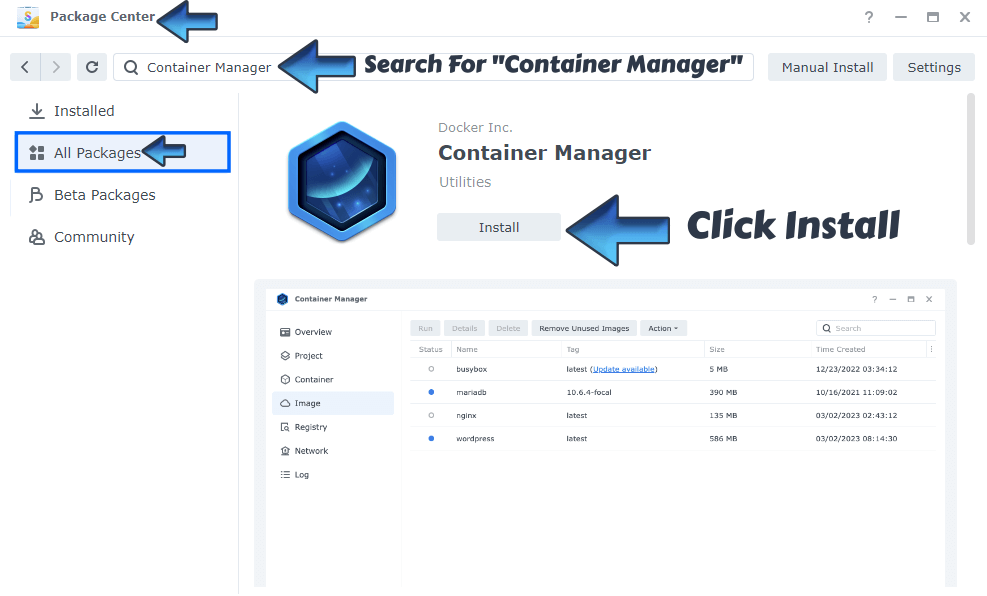
STEP 3
Install Portainer using my step by step guide. If you already have Portainer installed on your Synology NAS, skip this STEP. Attention: Make sure you have installed the latest Portainer version.
STEP 4
Go to File Station and open the docker folder. Inside the docker folder, create one new folder and name it wallabag. Follow the instructions in the image below.
Note: Be careful to enter only lowercase, not uppercase letters.
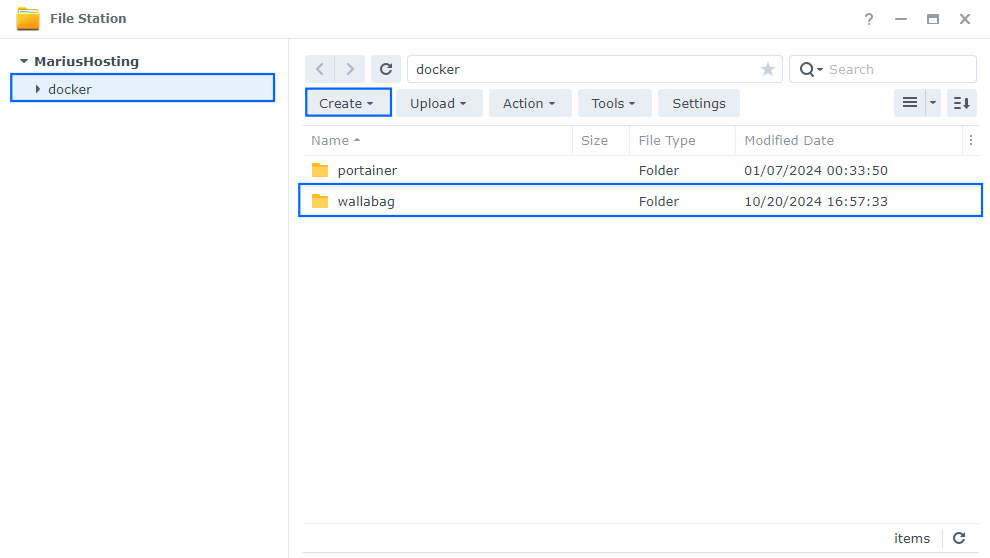
STEP 5
Now create four new folders inside the wallabag folder that you have previously created at STEP 4 name them data, db, images, redis. Follow the instructions in the image below.
Note: Be careful to enter only lowercase, not uppercase letters.
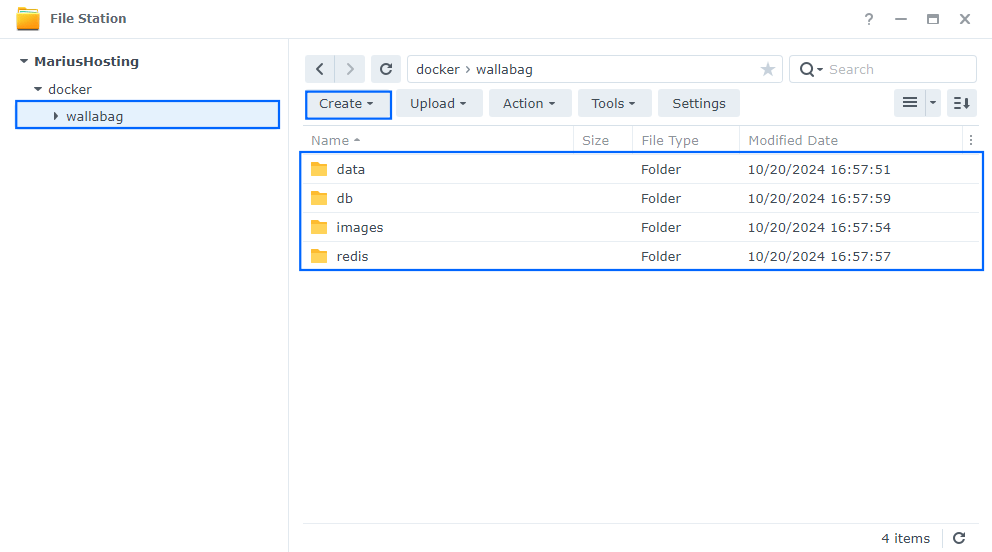
STEP 6
Log into Portainer using your username and password. On the left sidebar in Portainer, click on Home then Live connect. Follow the instructions in the image below.

On the left sidebar in Portainer, click on Stacks then + Add stack. Follow the instructions in the image below.

STEP 7
In the Name field type in wallabag. Follow the instructions in the image below.
services:
wallabag:
image: wallabag/wallabag
container_name: Wallabag
user: 0:0
environment:
- MYSQL_ROOT_PASSWORD=wallaroot
- SYMFONY__ENV__DATABASE_DRIVER=pdo_mysql
- SYMFONY__ENV__DATABASE_HOST=db
- SYMFONY__ENV__DATABASE_PORT=3306
- SYMFONY__ENV__DATABASE_NAME=wallabag
- SYMFONY__ENV__DATABASE_USER=wallabag
- SYMFONY__ENV__DATABASE_PASSWORD=wallapass
- SYMFONY__ENV__DATABASE_CHARSET=utf8mb4
- SYMFONY__ENV__DOMAIN_NAME=http://192.168.1.18:6749
- SYMFONY__ENV__SERVER_NAME=mariushosting
- SYMFONY__ENV__FOSUSER_CONFIRMATION=false
- SYMFONY__ENV__FOSUSER_REGISTRATION=true
- SYMFONY__ENV__TWOFACTOR_AUTH=true
ports:
- 6749:80
volumes:
- /volume1/docker/wallabag/images:/var/www/wallabag/web/assets/images:rw
- /volume1/docker/wallabag/data:/var/www/wallabag/data:rw
depends_on:
- db
- redis
restart: on-failure:5
db:
image: mariadb:11.8-noble #LTS Long Time Support Until October 15, 2033.
container_name: Wallabag-DB
healthcheck:
test: ["CMD", "healthcheck.sh", "--connect", "--innodb_initialized"]
interval: 10s
timeout: 5s
retries: 5
start_period: 30s
environment:
- MYSQL_ROOT_PASSWORD=wallaroot
- TZ=Europe/Bucharest
volumes:
- /volume1/docker/wallabag/db:/var/lib/mysql:rw
restart: on-failure:5
redis:
image: redis:alpine
container_name: Wallabag-REDIS
healthcheck:
test: ["CMD-SHELL", "redis-cli ping || exit 1"]
volumes:
- /volume1/docker/wallabag/redis:/data:rw
restart: on-failure:5
Note: Before you paste the code above in the Web editor area, change the values for SYMFONY__ENV__DOMAIN_NAME and add your own NAS IP followed with http:// at the beginning followed by :6749 at the end. 192.168.1.18 is my NAS IP. You should use your own NAS IP with http:// at the beginning followed by :6749
Note: Before you paste the code above in the Web editor area below, change the value for SYMFONY__ENV__SERVER_NAME and add your own server name. mariushosting is an example of a server name; you have to add your own server name.
Note: Before you paste the code above in the Web editor area, change the value for TZ with your own time zone value. (Select your current Time Zone from this list.)
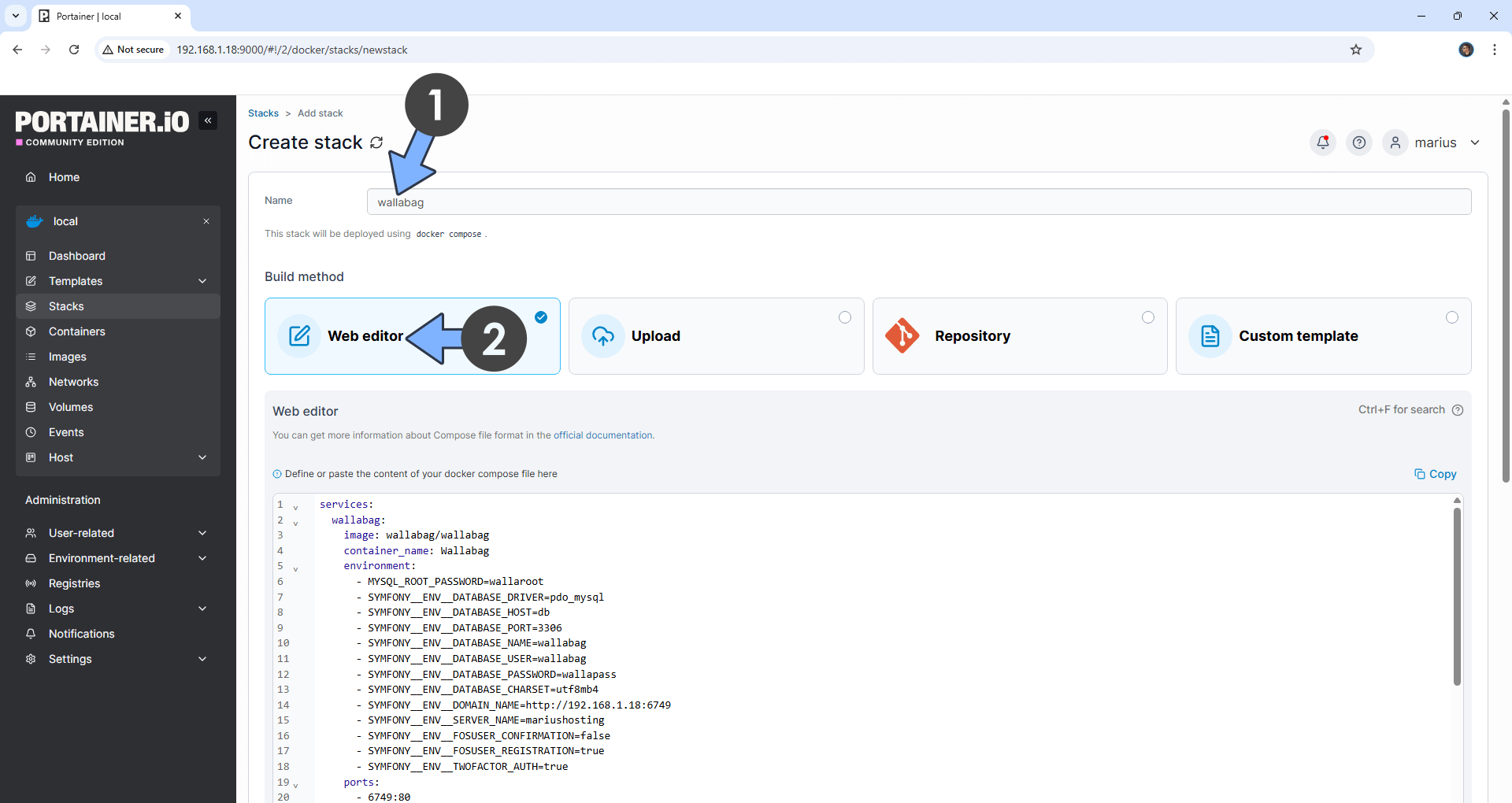
STEP 8
Scroll down on the page until you see a button named Deploy the stack. Click on it. Follow the instructions in the image below. The installation process can take up to a few minutes. It will depend on your Internet speed connection.
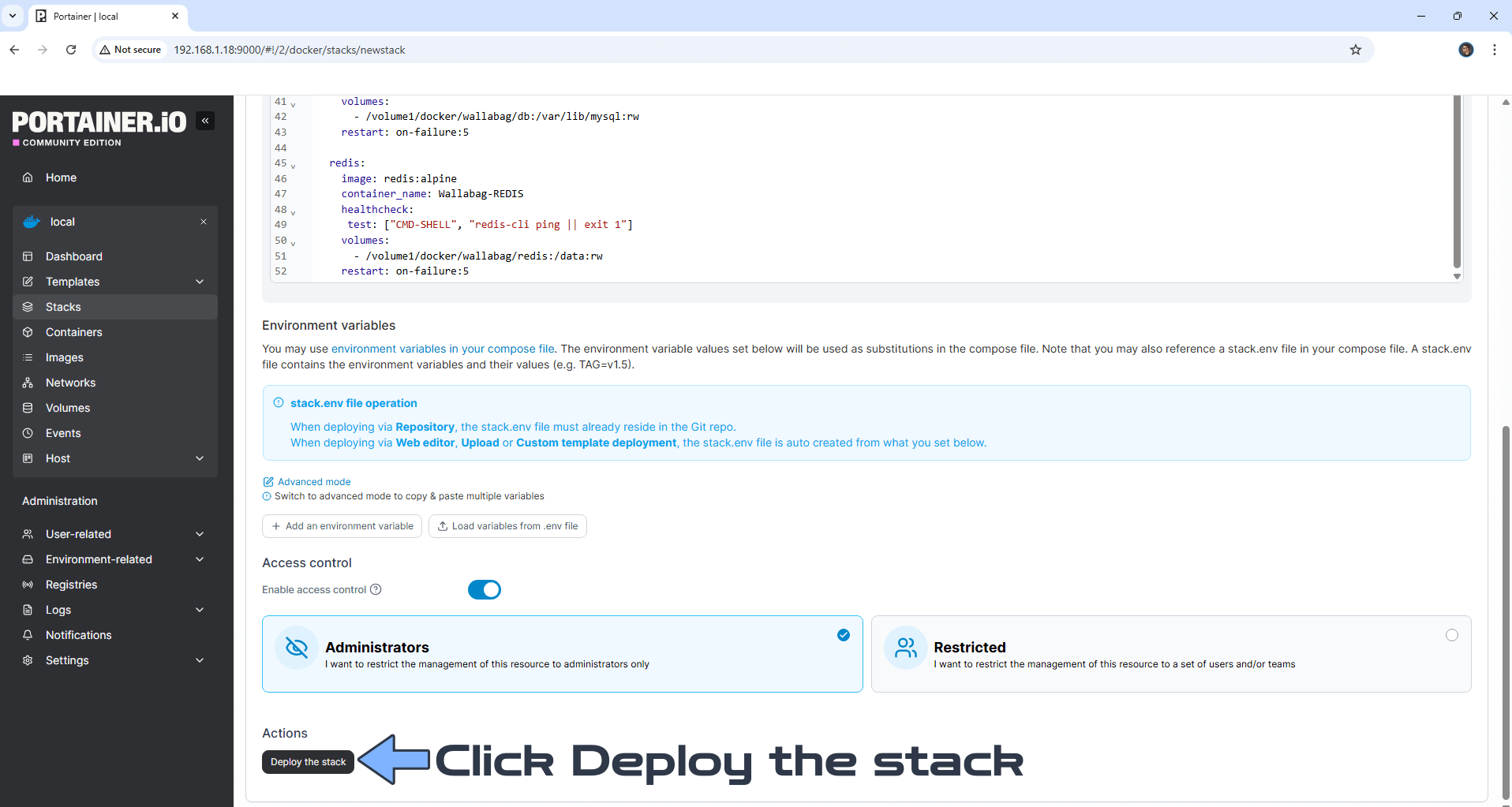
STEP 9
If everything goes right, you will see the following message at the top right of your screen: “Success Stack successfully deployed“.

STEP 10
🟢Please Support My work by Making a Donation. Almost 99,9% of the people that install something using my guides forget to support my work, or just ignore STEP 1. I’ve been very honest about this aspect of my work since the beginning: I don’t run any ADS, I don’t require subscriptions, paid or otherwise, I don’t collect IPs, emails, and I don’t have any referral links from Amazon or other merchants. I also don’t have any POP-UPs or COOKIES. I have repeatedly been told over the years how much I have contributed to the community. It’s something I love doing and have been honest about my passion since the beginning. But I also Need The Community to Support me Back to be able to continue doing this work.
STEP 11
Please wait approximately 3 minutes for the installation to be completed or you will get a blank page if you try to connect too soon. Now open your browser and type in http://Synology-ip-address:6749 Click REGISTER. Follow the instructions in the image below.
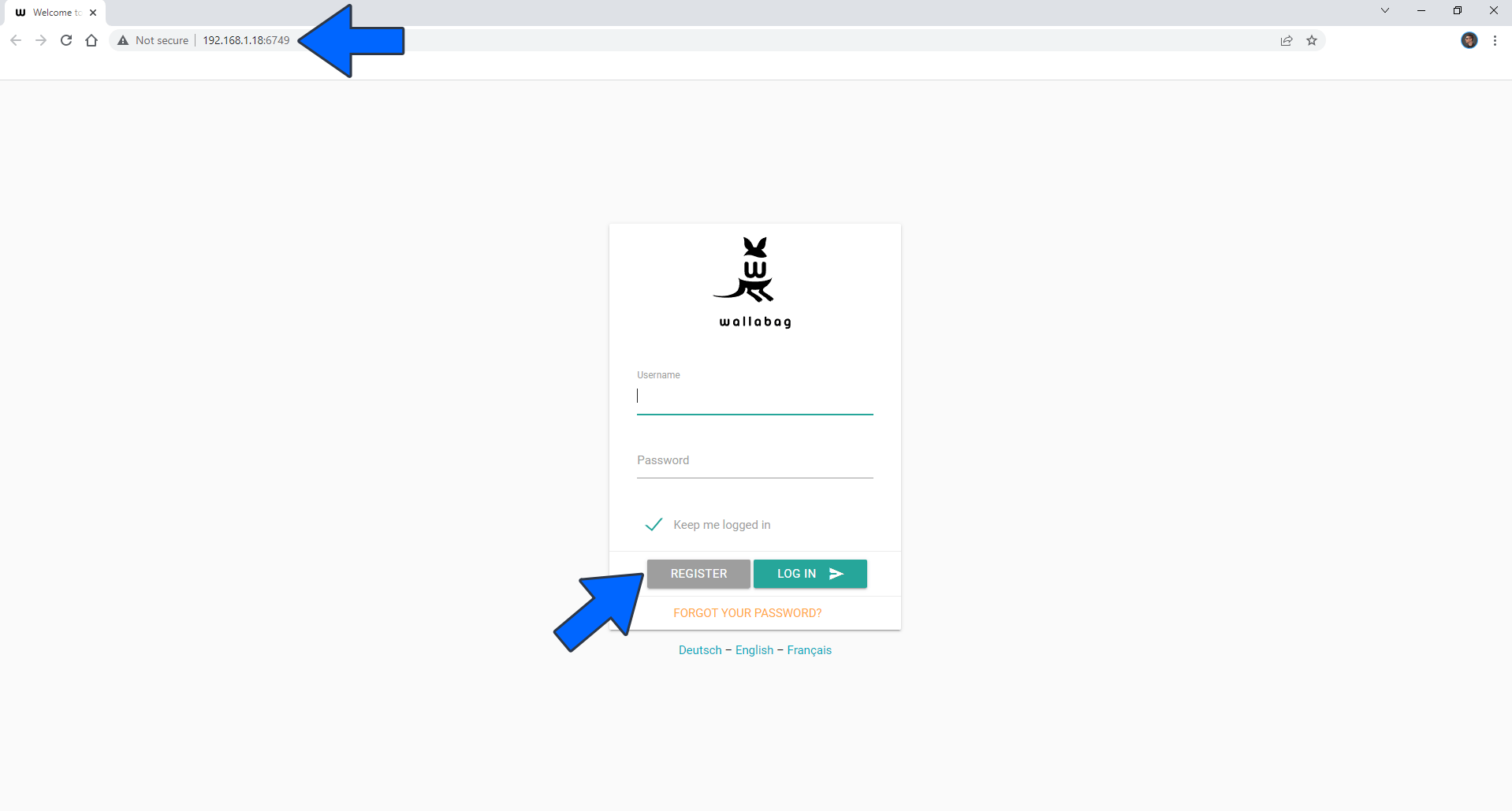
STEP 12
Add your own Email, Username and Password. Click REGISTER. Follow the instructions in the image below.
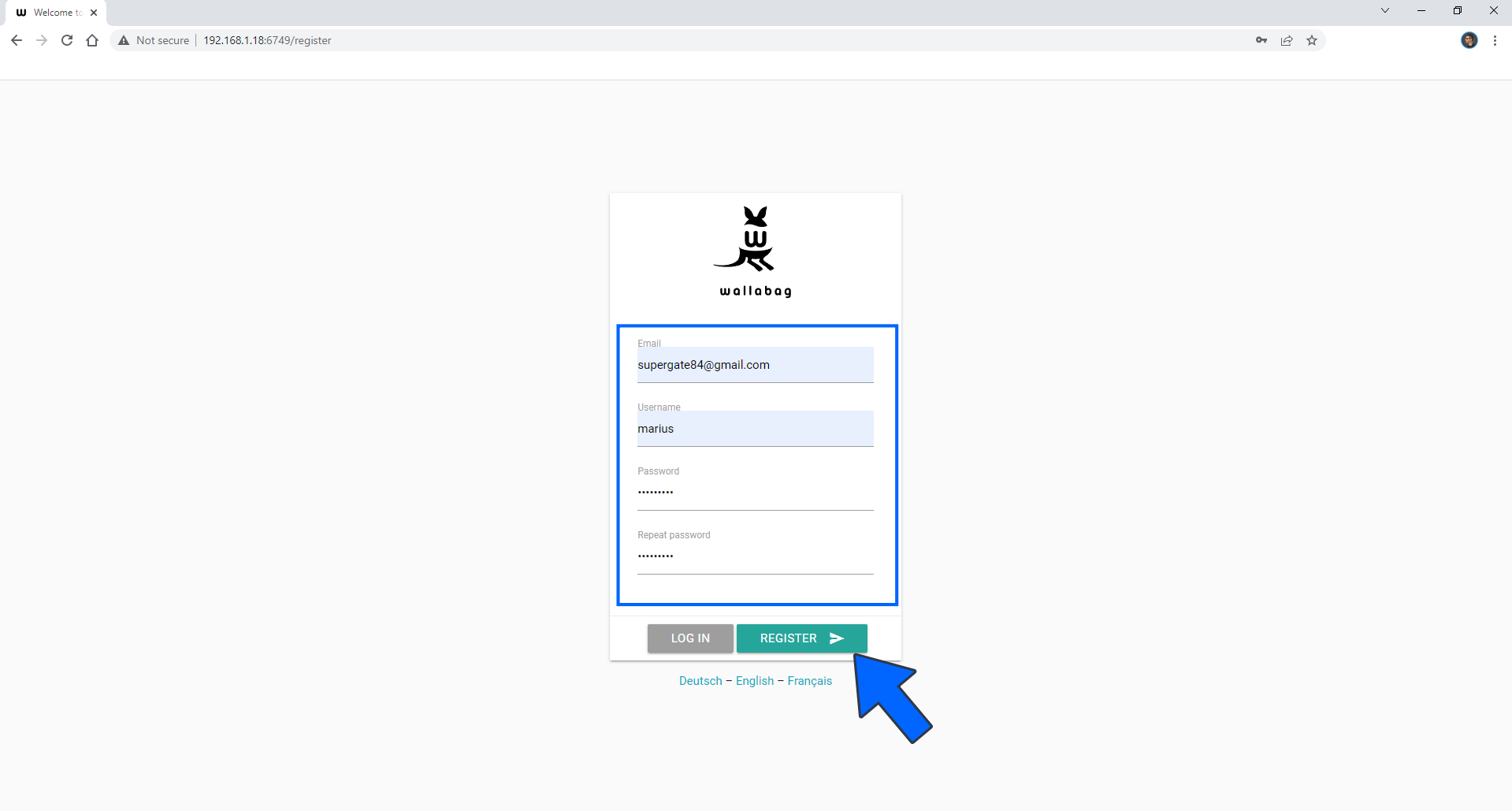
STEP 13
Click GO TO YOUR ACCOUNT. Follow the instructions in the image below.
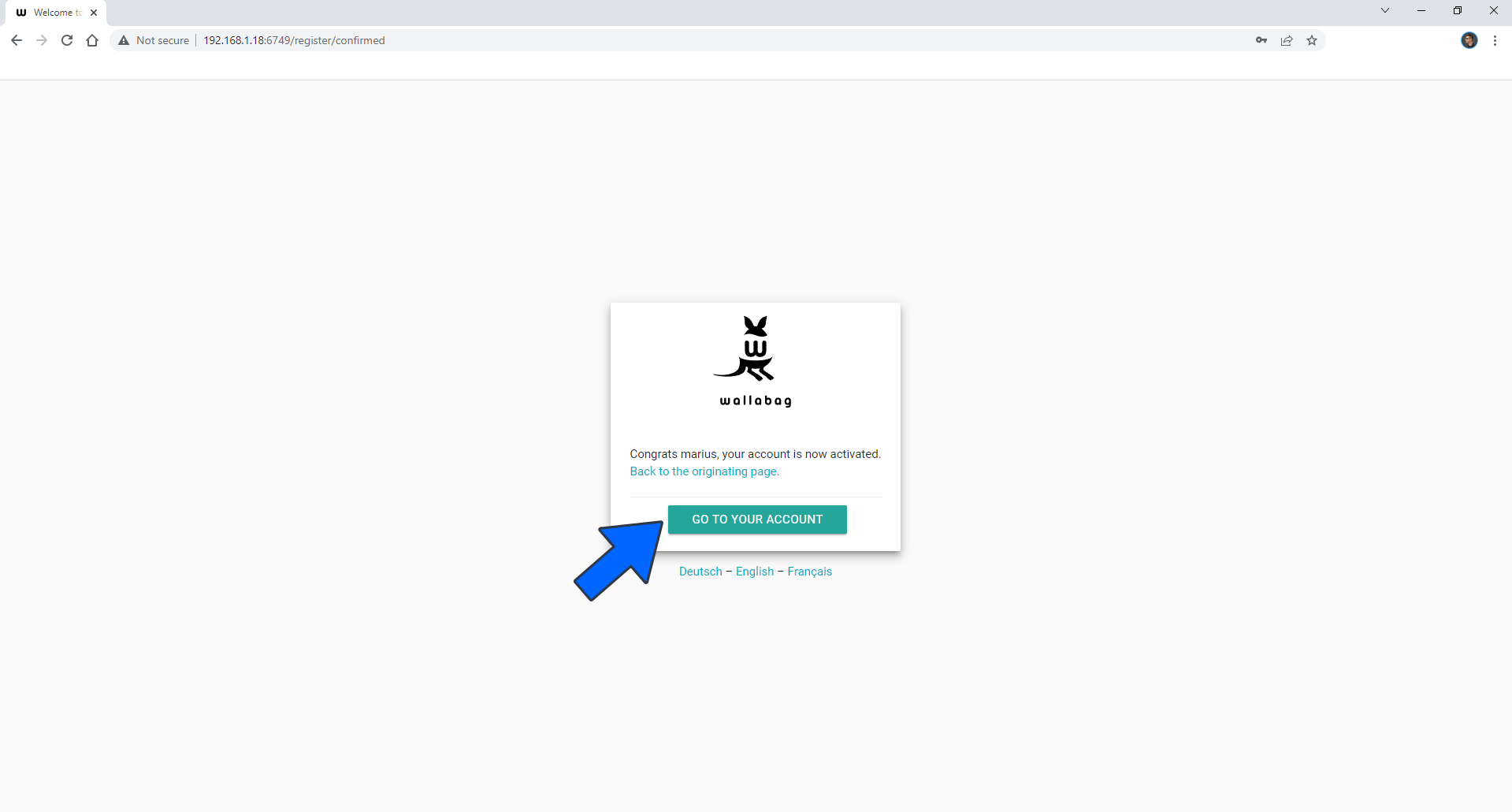
STEP 14
You can start adding your first website link. Click the + icon at the top right of the page. Follow the instructions in the image below.
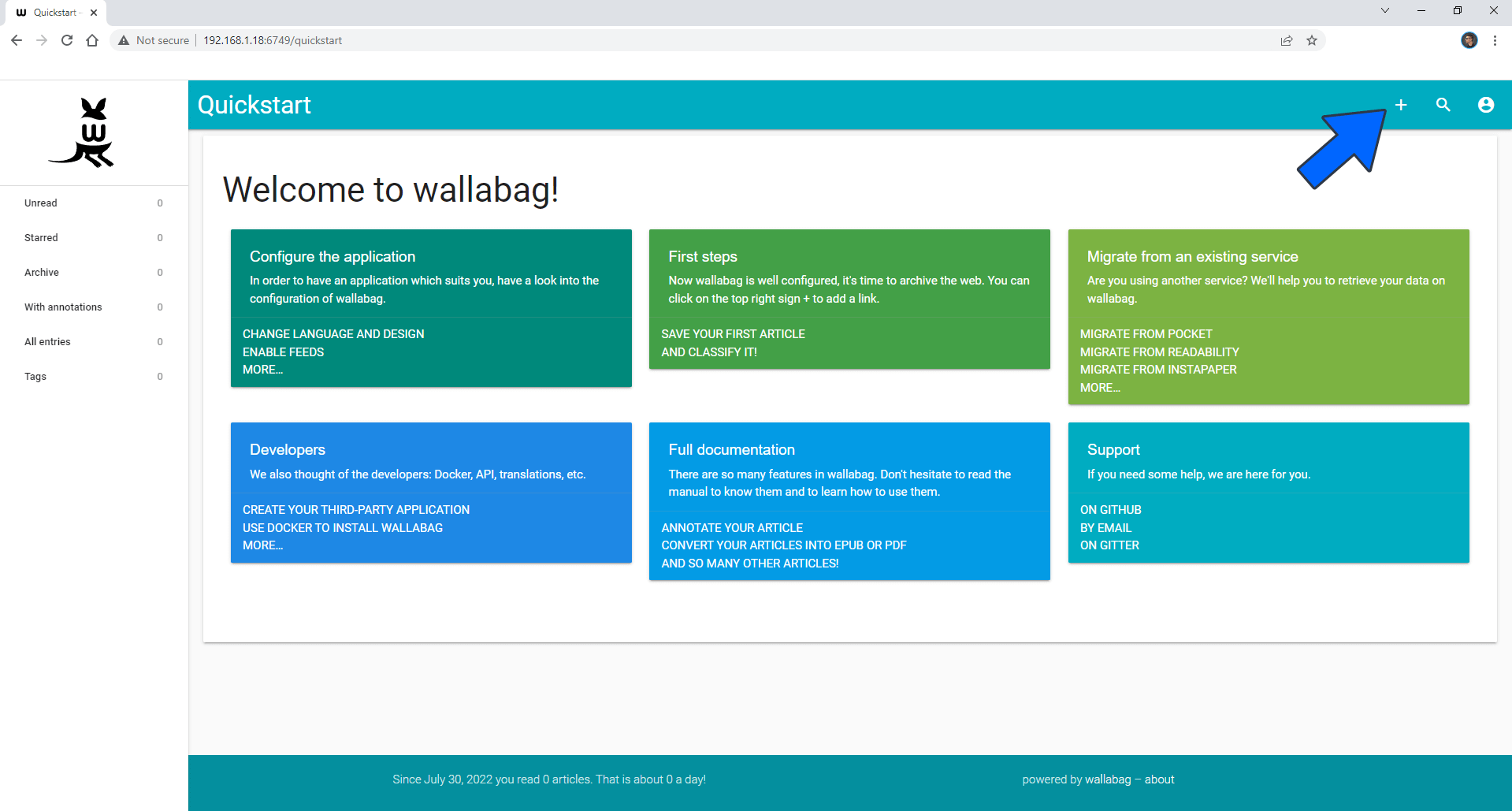
STEP 15
Your Wallabag dashboard will look like the screenshot below.
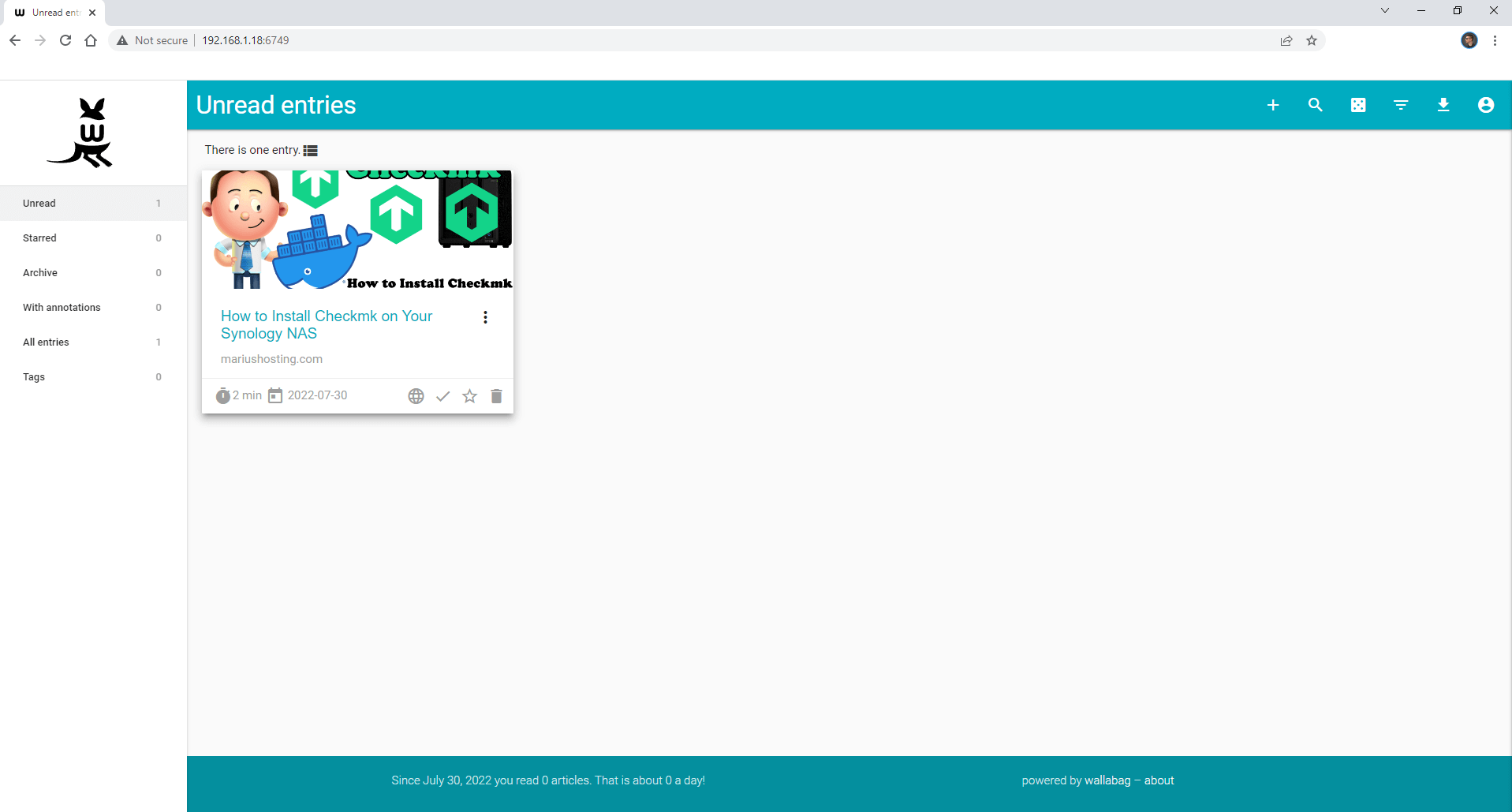
STEP 16
You can set the Dark theme by clicking the profile icon at the top right of the page. Follow the instructions in the image below.
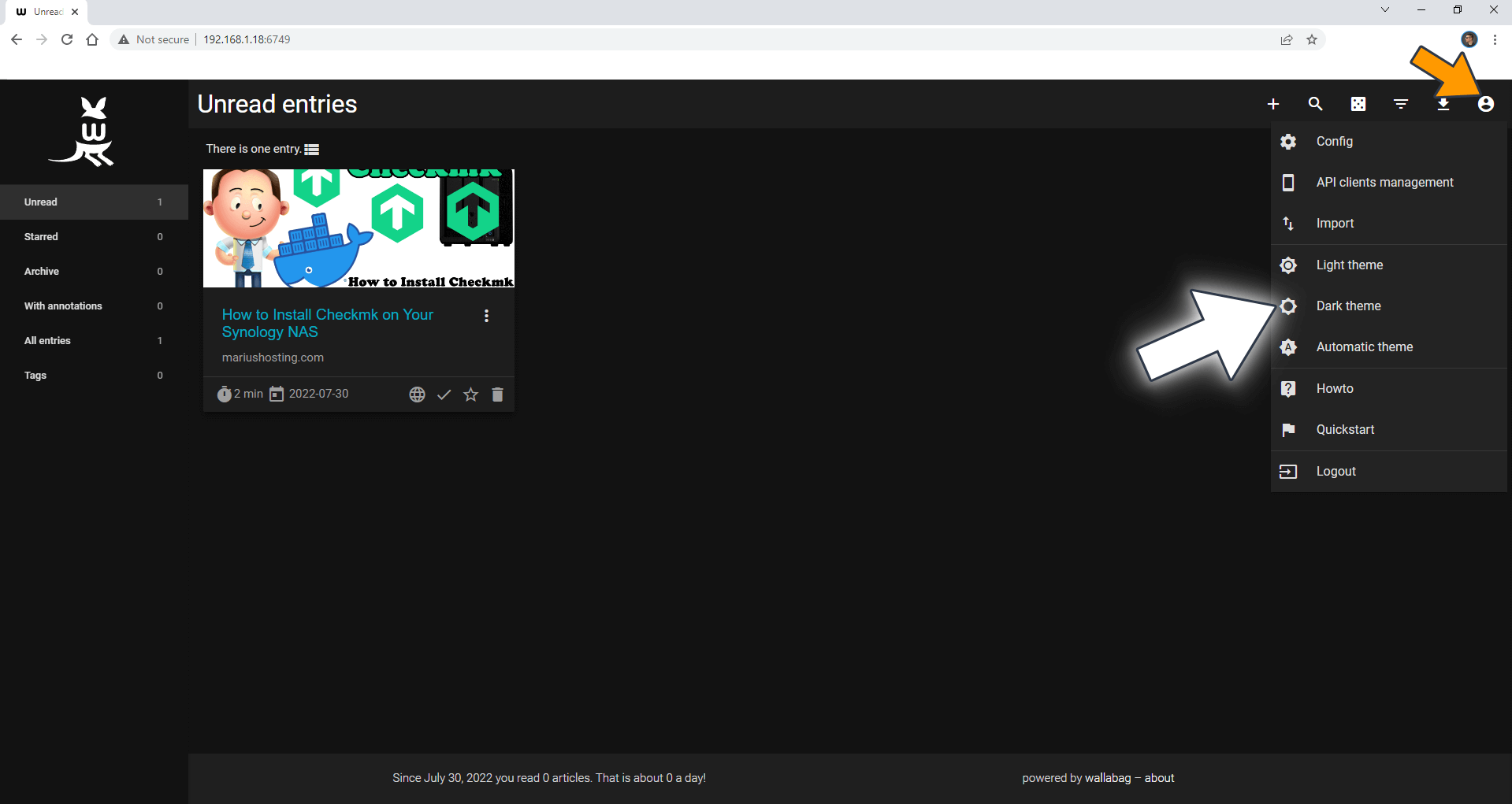
Enjoy Wallabag!
If you want to disable public registration to your Wallabag instance, just change the following line at STEP 7
- SYMFONY__ENV__FOSUSER_REGISTRATION=truewith
- SYMFONY__ENV__FOSUSER_REGISTRATION=falseThen update the stack to apply the new settings.
If you encounter issues by using this container, make sure to check out the Common Docker issues article.
Note: If you want to run the Wallabag container over HTTPS, check my guide on How to Run Docker Containers Over HTTPS. To make sure https will work without any issue with Wallabag, remember to change the environment variable – SYMFONY__ENV__DOMAIN_NAME at STEP 7 pointing to your synology.me DDNS instead of your local IP. You need to update your stack. In order to make Wallabag work via HTTPS, it’s mandatory to activate WebSocket.
Note: Can I run Docker on my Synology NAS? See the supported models.
Note: How to Back Up Docker Containers on your Synology NAS.
Note: Find out how to update the Wallabag container with the latest image.
Note: How to Free Disk Space on Your NAS if You Run Docker.
Note: How to Schedule Start & Stop For Docker Containers.
Note: How to Activate Email Notifications.
Note: How to Add Access Control Profile on Your NAS.
Note: How to Change Docker Containers Restart Policy.
Note: How to Use Docker Containers With VPN.
Note: Convert Docker Run Into Docker Compose.
Note: How to Clean Docker.
Note: How to Clean Docker Automatically.
Note: Best Practices When Using Docker and DDNS.
Note: Some Docker Containers Need WebSocket.
Note: Find out the Best NAS Models For Docker.
Note: Activate Gmail SMTP For Docker Containers.
This post was updated on Friday / February 6th, 2026 at 8:14 PM
